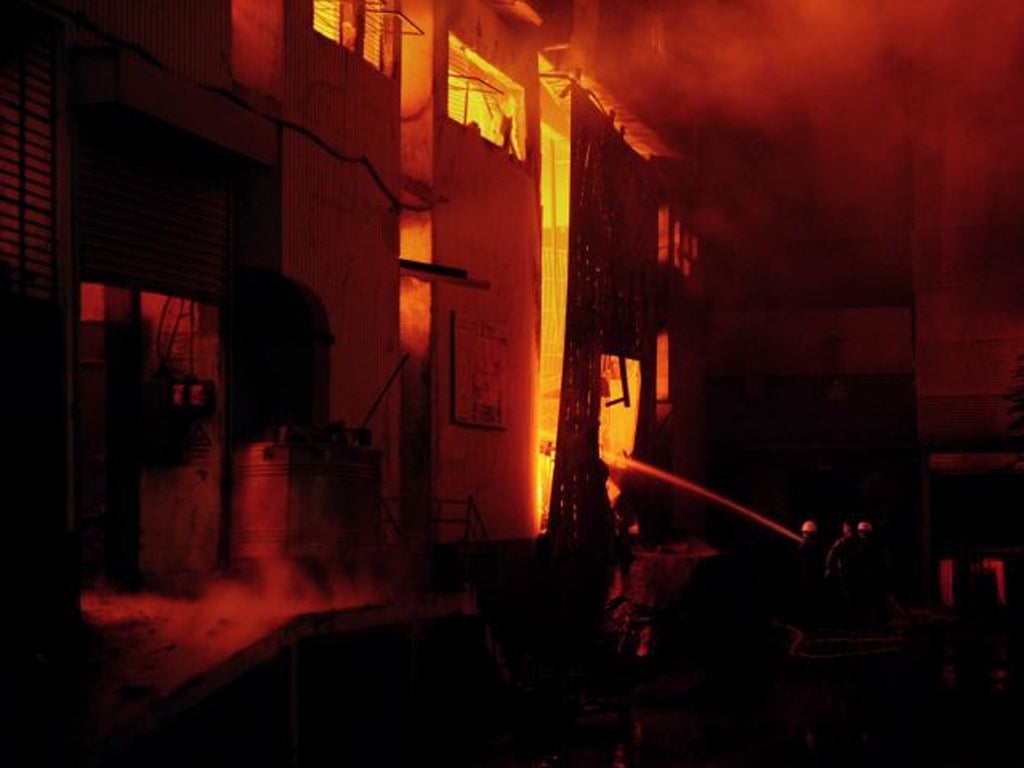Death toll in Pakistan factory fires rises to 216

The death toll from a pair of devastating factory fires that broke out in Pakistan's two biggest cities rose to 216 people today, many of whom perished because they were unable to escape buildings that lacked emergency exits and basic safety equipment such as alarms and sprinklers.
Such safety issues are common in Pakistan, where many factories are set up illegally in the country's densely populated cities, and owners often pay officials bribes to look the other way. The number of deaths from the two fires that broke out last night could trigger calls for better oversight of industrial safety.
The more deadly blaze was at a garment factory in the southern city of Karachi, the country's economic heart. The death toll from the fire rose to 191 peopletoday, as firefighters continued to battle the blaze, said Roshan Ali Sheikh, a senior government official in Karachi. It was one of the worst industrial accidents in Pakistan's 65-year history.
Most of the deaths were caused by suffocation as people caught in the basement were unable to escape when it filled with smoke, said the top firefighter in Karachi, Ehtisham-ud-Din. There were no fire exits, and the doors leading out of the basement were locked, he said. It's unclear what caused the fire.
Workers on higher floors of the five-story building struggled to make it out of windows that were covered with metal bars. Many were injured when they jumped from the building, including a 27-year-old pregnant woman who was injured in the fall.
Another injured factory worker, Mohammad Ilyas, speaking from the hospital, said he was working with roughly 50 other men and women on one of the floors when suddenly a fireball came from the staircase.
"I jumped from my seat as did others and rushed toward the windows, but iron bars on the windows barred us from escaping. Some of us quickly took tools and machines to break the iron bars," he said. "That was how we managed to jump out of the windows down to the ground floor."
His leg was injured in the fall.
Others weren't so lucky. An Associated Press reporter saw a charred body partially hanging out one of the factory's barred windows. It appeared the victim tried to escape but couldn't make it through the bars.
"There were no safety measures taken in the building design. There was no emergency exit. All the people got trapped," said senior police official Amjad Farooqi.
The factory's managers have fled and are being sought by police, said Sheikh, the senior government official in Karachi. Authorities have placed the name of the factory's owner on a list of people who are not allowed to leave the country, said Sheikh.
A fire also swept through a four-story shoe factory in the eastern city of Lahore last night, killing 25 people, some from burns and some from suffocation, said senior police officer Multan Khan. The factory was illegally set up in a residential part of the city.
It broke out when people in the building were trying to start their generator after the electricity went out. Sparks from the generator made contact with chemicals used to make the shoes, igniting the blaze. Pakistan faces widespread blackouts, and many people use generators to provide electricity for their houses or to run businesses.
One of the workers, Muhammad Shabbir, said he had been working at the factory for six months along with his cousin. He said all the chemicals and the generator were located in the garage, which was also the only way out of the building. When the fire ignited, there was no way to escape. Shabbir said he had just gone outside the factory when the fire started, but his cousin was severely burned and died at the hospital.
A firefighter at the scene, Numan Noor, said the reason most of the victims died was because the main escape route was blocked.
"The people went to the back side of the building but there was no access, so we had to make forceful entries and ... rescue the people," said Noor.
Firefighters broke holes in the factory's brick walls to reach victims inside. At the morgue, bodies were lined up on a hallway floor, covered with white sheets.
Pakistani Prime Minister Raja Pervaiz Ashraf expressed his shock and grief over the deaths in both cities.
AP
Join our commenting forum
Join thought-provoking conversations, follow other Independent readers and see their replies
Comments
Bookmark popover
Removed from bookmarks